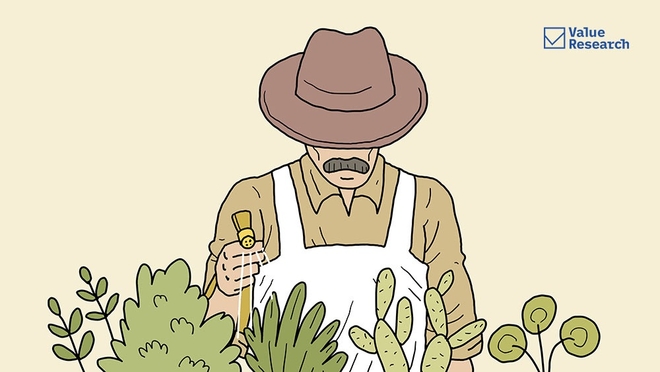 Anand Kumar
Anand Kumar
Many years ago, there was a movie named 'Being There', starring the great comedian Peter Sellers. Sellers played a character named Chance, who had spent his entire life as a gardener in the mansion of his wealthy employer. Chance was extremely simple-minded, to put it politely. He had only tended to the garden and watched TV all his life. After his benefactor's death, he is forced to go out into the world and, through a series of amusing misunderstandings, becomes recognised as a great expert on the economy.
He achieves this reputation by simply repeating basic facts about gardening: "As long as the roots are not severed, all is well. The plant will grow" and "After the winter, spring comes, and there is growth."
At that time, it seemed funny that people could take such ridiculously simple things as great wisdom about the economy and the markets. However, with some decades of experience behind me, my opinion has reversed. Such simple-minded principles are much more useful in understanding investments than complicated hypotheses about what is going on in the economy and business world.
At the movie's end, Chance the gardener appears set to become the next President of the United States.
Anyhow, amid the booming equity markets that we have had in the recent past, far too many investors are getting pointlessly worried. They need to pay attention to what Chance, the gardener, said. The annual cycles of nature apply to economies and financial markets just as to gardens. The barren season always comes, yet the growth season inevitably follows. Storm clouds gather, rains fall, plants droop, and sometimes there are droughts and floods, but eventually, nature nourishes and growth resumes.
The roots of economic growth are deep and resilient. People, leadership, innovation and productivity continue growing through bull and bear cycles. Societies progress, living standards improve and wealth accumulates over long arcs of history despite setbacks. Far too many people are worried about irrelevant things. The current thing with the chronic worriers is that the markets have gone up too high and too fast and are set for a crash. Are they right? They could be, but it's not very irrelevant.
The other day, I saw this amusing set of numbers. Over the last three years, the general Wall Street forecast of the US equity market's performance has been 7 per cent, 9 per cent and 7 per cent, respectively. The actual performance was 27 per cent, -19 per cent and 24 per cent, respectively. Wasn't the forecast ridiculously wrong? It was, but here's the fascinating thing. Aggregated over the three years, the forecast was +25 per cent while the actual performance was +28 per cent. So, while the estimates managed to look stupid for each of the three years, what was stupid about it was the idea of having an annual forecast. A three-year forecast would have been more accurate.
Over the course of two or three years, the markets will track corporate profits and the economy in general. Any given year does not matter. As long as these underlying factors are there, and you are not obsessing over each month's or year's numbers, it will all work out. Moreover, roughly half the market will do better than the average. As an investor, you must invest in the better half of the market. We, at Value Research, are here to do that with 'Mutual Fund Insight' and our website.
Chances are the gardener offered simple wisdom - remain grounded in the enduring patterns and cycles. The plant's roots nourish it through all kinds of hardships. The growth season always returns.
Similarly, investors should take care of the roots - choose good mutual funds, steadily contribute to a diversified portfolio, rebalance whenever required and harvest some crops when needed.
Over long horizons, your investments will bear fruit. Avoid pulling out those roots in panic, and keep faith that the cycle always turns around.








